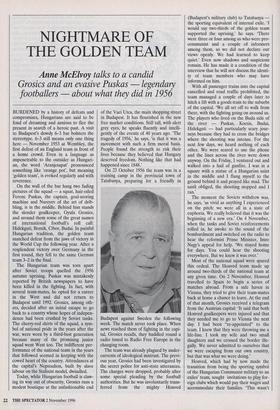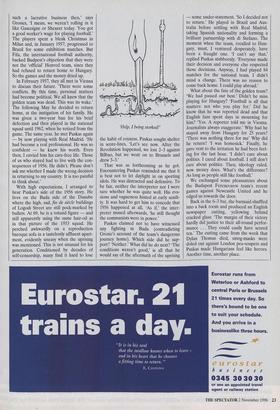NIGHTMARE OF THE GOLDEN TEAM
Anne McElvoy talks to a candid
Grosics and an evasive Puskas — legendary footballers — about what they did in 1956
BURDENED by a history of defeats and compromises, Hungarians are said to be fond of dreaming and anxious to flee the present in search of a heroic past. A visit to Budapest's dowdy 6-3 bar bolsters the stereotype. 6-3 still means only one thing here — November 1953 at Wembley, the first defeat of an England team in front of a home crowd. Even in a language as impenetrable to the outsider as Hungari- an, the word 'Aranjcsapat' pronounced something like 'orange pot', but meaning `golden team', is evoked regularly and with reverence.
On the wall of the bar hang two fading pictures of the squad — a squat, hair-oiled Ferenc Puskas, the captain, goal-scoring machine and Nureyev of the art of drib- bling, is in the middle. Behind him stands the slender goalkeeper, Gyula. Grosics, and around them some of the great names of international football's roll call: Hidekguti, Bozsik, Cibor, Budai. In painful Hungarian tradition, the golden team snatched defeat from the jaws of victory in the World Cup the following year. After a resplendent victory over Germany in the first round, they fell to the same German team 3-2 in the final.
The Hungarian team was torn apart after Soviet troops quelled the 1956 autumn uprising. Puskas was mistakenly reported by British newspapers to have been killed in the fighting. In fact, with several team-mates, he opted for a career in the West and did not return to Budapest until 1992. Grosics, among oth- ers, decided after an initial escape to go back to a country whose hopes of indepen- dence had been crushed by Soviet tanks. The cherry-red shirts of the squad, a sym- bol of national pride in the years after the war, were worn by a third-best generation because many of the promising junior squad went West too. The indifferent per- formance of the national team in the years that followed seemed in keeping with the cowed heart of the country. Attendances at the capital's Nepstadion, built by slave labour on the Stalinist model, dwindled.
Today, while Hungarian football is claw- ing its way out of obscurity, Grosics runs a modest boutique at the unfashionable end of the Vaci Utca, the main shopping street in Budapest. It has flourished in the new free market conditions. Still tall, with alert grey eyes, he speaks fluently and intelli- gently of the events of 40 years ago. The tragedy of 1956,' he says, 'is that it was a movement with such a firm moral basis. People found the strength to risk their lives because they believed that Hungary deserved freedom. Nothing like that had happened since 1848.'
On 23 October 1956 the team was in a training camp in the provincial town of Tatabanya, preparing for a friendly in Budapest against Sweden the following week. The match never took place. When news reached them of fighting in the capi- tal, Grosics recalls, they huddled round a radio tuned to Radio Free Europe in the changing room.
The team was already plagued by under- currents of ideological mistrust. The previ- ous year, Grosics had been investigated by the secret police for anti-state utterances. The charges were dropped, probably after some special pleading by the football authorities. But he was involuntarily trans- ferred from the mighty Honved (Budapest's military club) to Tatabanya the sporting equivalent of internal exile. 'I would say two-thirds of the golden team supported the uprising,' he says. 'There were three or four among us who were pro- communist and a couple of informers among them, so we did not declare our views openly. We had learned to keep quiet.' Even now shadows and suspicions remain. He has made it a condition of the interview that he will not discuss the identi- ty of team members who may have informed on him.
With all passenger trains into the capital cancelled and road traffic prohibited, the team managed a couple of days later to hitch a lift with a goods train to the suburbs of the capital. 'We all set off to walk from there, with the fighting going on around us. The players who lived on the Buda side of the river — Puskas, Kocsis, Budai, Hidekguti — had particularly scary jour- neys because they had to cross the bridges where the shooting was intense. For the next few days, we heard nothing of each other. We were scared to use the phone and the lines across the river were down anyway. On the Friday, I ventured out and walked into a hail of gunfire. I was in a square with a statue of a Hungarian saint in the middle and I flung myself to the ground behind it and prayed like mad. The saint obliged, the shooting stopped and I ran.'
The moment the Soviets withdrew was, he says, 'as vivid as anything I experienced on the pitch: we were all in a state of euphoria. We really believed that it was the beginning of a new era.' On 4 November, when the tanks and Soviet reinforcements rolled in, he awoke to the sound of the bombardment and switched on the radio to hear the reformist Prime Minister, Imre Nagy's appeal for help. 'We stayed home for days. You could hear the shooting everywhere. But we knew it was over.'
Most of the national squad were spared this ordeal. The Honved team made up around two-thirds of the national team at any given time. On 2 November, Honved travelled to Spain to begin a series of matches abroad. From a safe haven in Vienna, they tried to give their team-mates back at home a chance to leave. At the end of that month, Grosics received a telegram from the Austrian capital: It said that both Honved goalkeepers were injured and that they needed me to go to Vienna the next day. I had been "re-appointed" to the team. I knew that they were throwing me a life-line. I took my wife and two small daughters and we crossed the border ille- gally. We never admitted to ourselves that we were escaping from our own country, but that was what we were doing.'
Honved, which had by now made the transition from being the sporting symbol of the Hungarian Communist military to an exiles' team, sought invitations to play for- eign clubs which would pay their wages and accommodate their families. 'This wasn't such a lucrative business then,' says Grosics, 'I mean, we weren't rolling in it like Gascoigne or Shearer today. You got a good worker's wage for playing football.' The players spent a bleak Christmas in Milan and, in January 1957, progressed to Brazil for some exhibition matches. But Fifa, the international football authority, backed Budpest's objection that they were not the 'official' Honved team, since they had refused to return home to Hungary. So the games and the money dried up.
In February 1957, they all met in Vienna to discuss their future. 'There were some conflicts. By this time, personal matters had become political. We all knew that the golden team was dead. This was its wake.' The following May he decided to return home, at the instigation of his family. He was given a two-year ban for his brief defection and then played in the national squad until 1962, when he retired from the game. The same year, he met Puskas again — by now playing with Real Madrid. 'He had become a real professional. He was so confident — he knew his worth. Even then, I envied him his care-free life. Those of us who stayed had to live with the con- sequences of 1956. He didn't. Please don't ask me whether I made the wrong decision in returning to my country. It is too painful to think about.'
With high expectations, I arranged to hear Puskas's side of the 1956 story. He lives on the Buda side of the Danube where the high, sad, fin de siecle buildings of Logodi Street are still pock-marked by bullets. At 69, he is a rotund figure — and still apparently using the same hair-oil as in that picture of the 1953 squad. He perched awkwardly on a reproduction baroque sofa in a tastelessly affluent apart- ment, evidently uneasy when the uprising was mentioned. This is not unusual for his generation. Conditioned by decades of self-censorship, many find it hard to lose Help, I being storked!'
the habit of coyness. Puskas sought shelter in score-lines, 'Let's see now. After the Revolution happened, we lost 2-3 against Bilbao, but we went on to Brussels and drew 3-3.'
That was as forthcoming as he got. Encountering Puskas reminded me that it is best not to let daylight in on sporting idols. He was distracted and defensive. To be fair, neither the interpreter nor I were sure whether he was quite well. His eva- sions and vagueness hinted at early senili- ty. It was hard to get him to concede that 1956 happened at all. 'As if,' the inter- preter mused afterwards, 'he still thought the communists were in power.'
Puskas claimed not to have witnessed any fighting in Buda (contradicting Grosic's account of the team's dangerous journey home). Which side did he sup- port? 'Neither.' What did he do next? 'The conditions weren't good,' is all that he would say of the aftermath of the uprising — some under-statement. `So I decided not to return.' He played in Brazil and Aus- tralia before settling with Real Madrid, taking Spanish nationality and forming a brilliant partnership with di Stefano. The moment when the team, recalled to Hun- gary, must, I ventured desperately, have been a fraught one. 'I can't say that,' replied Puskas stubbornly. 'Everyone made their decision and everyone else respected those decisions. Anyway, I had played 84 matches for the national team. I didn't mind a change. There was no reason to come back home. I could play abroad.'
What about the fate of the golden team? `We had passed our best.' Didn't he miss playing for Hungary? 'Football is all that matters: not who you play for.' Did he know that he was reported dead and that English fans spent days in mourning for him? 'Yes. A reporter told me in Vienna. Journalists always exaggerate.' Why had he stayed away from Hungary for 25 years? `There was nothing there for me' Why did he return? 'I was homesick.' Finally, he gave vent to the irritation he had been feel- ing for the last hour. didn't care about politics. I cared about football. I still don't care about politics. Then, ideology ruled, now money does. What's the difference? As long as people still like football.'
We exchanged some pleasantries about the Budapest Ferencvaros team's recent games against Newcastle United and he edged us towards the door.
Back in the 6-3 bar, the barmaid shuffled into a back room and produced an English newspaper cutting, yellowing behind cracked glass: 'The margin of their victory hardly did justice to their all-round perfor- mance . . . They could easily have scored ten.' The cutting came from the week that Dylan Thomas died, smog-masks were doled out against London pea-soupers and Puskas made Hungarians feel like heroes. Another time, another place.



















































































 Previous page
Previous page